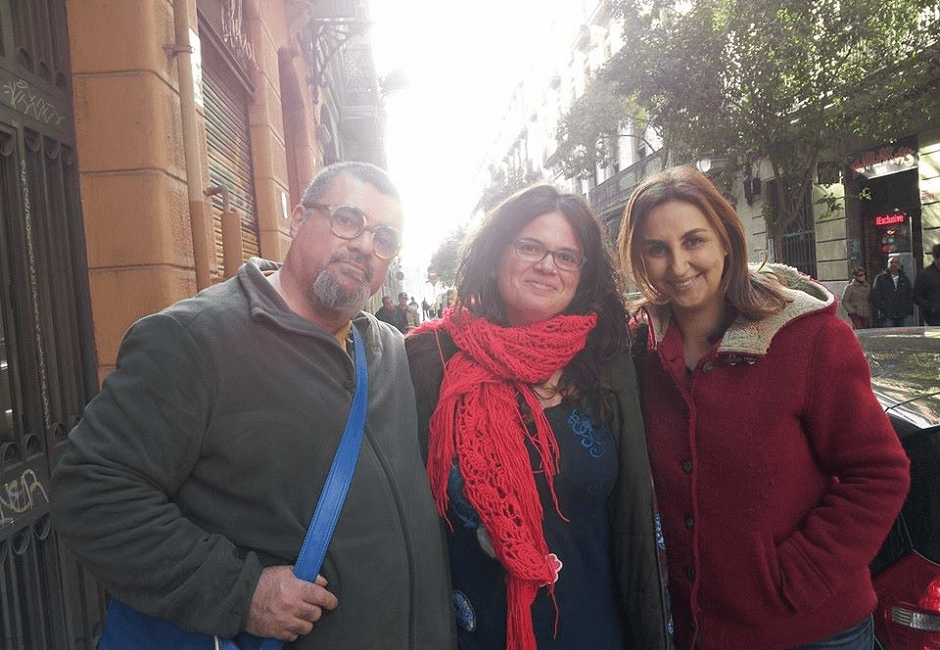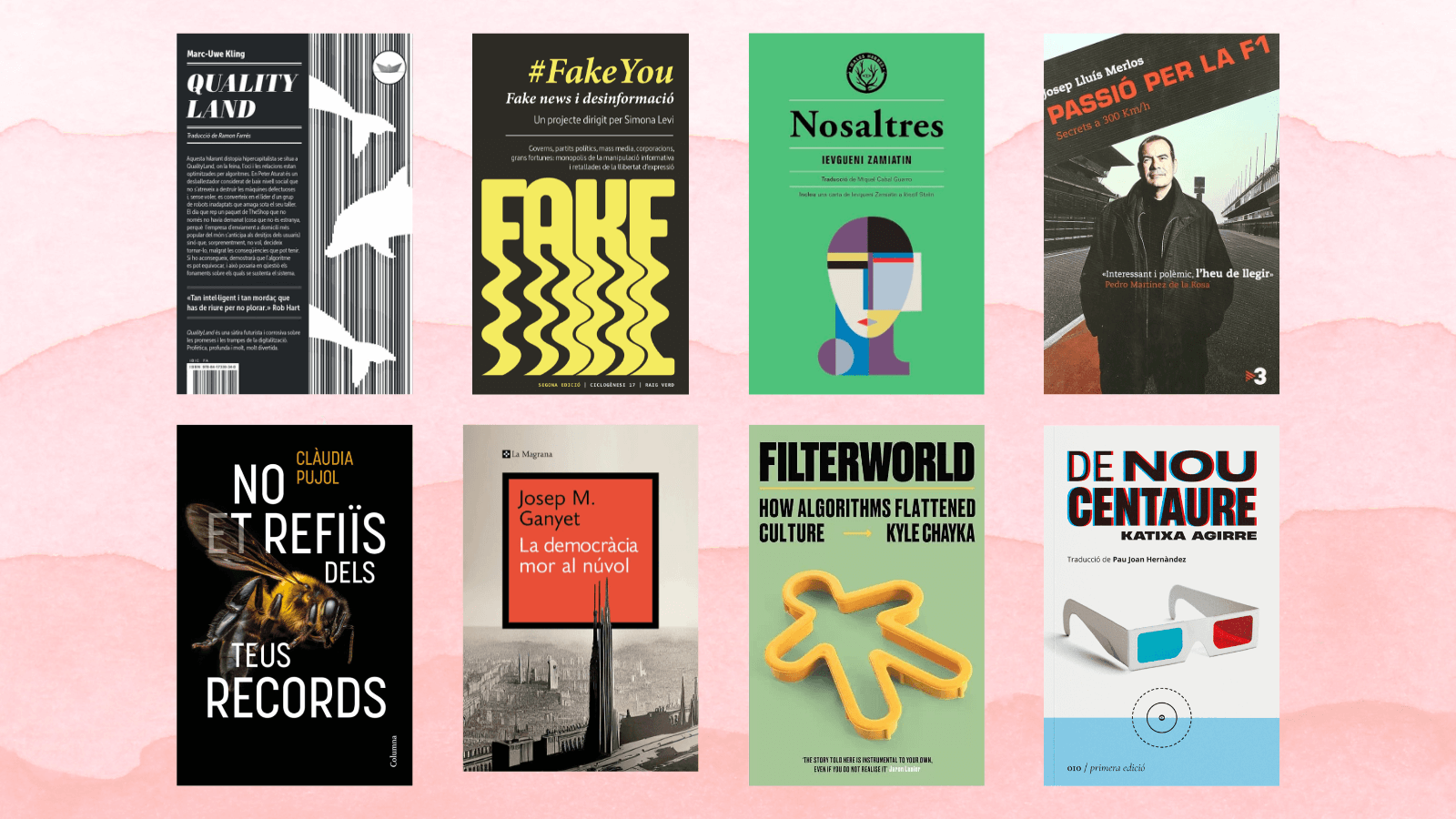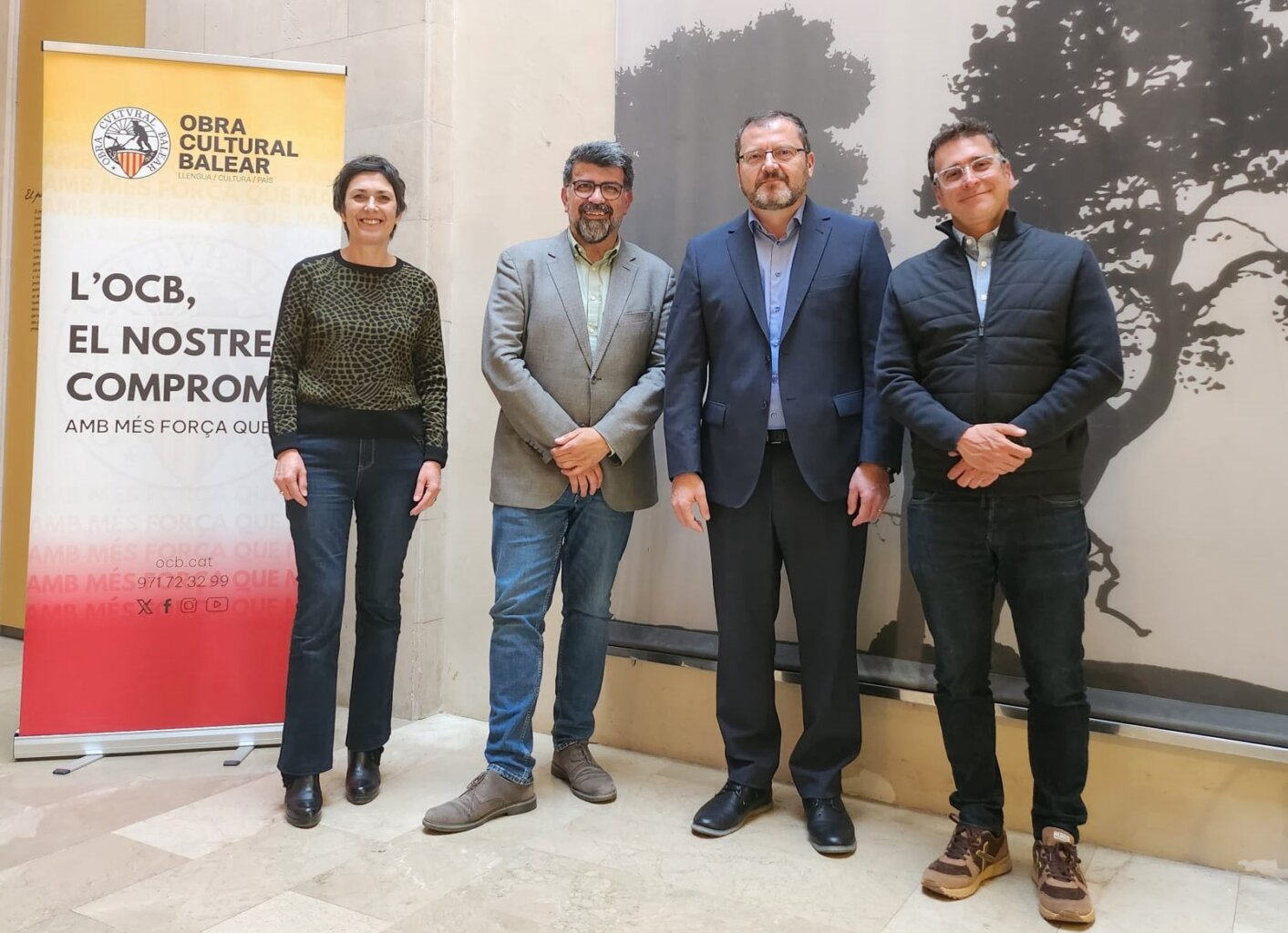“We want to normalise Catalan within tourism”

Do you remember the jokes starting with “a German, a Dutch and an Italian meet …”? Well, this story starts in a similar way, but it is not a joke. Pep from Berlin, Vanessa from the Netherlands and Maria from Rome were clear about the fact that they wanted to do something for tourism in Catalan abroad, so they came together to work on a common project and, in 2012, established the Association of World Catalan Guides.
Do you remember the jokes starting with “a German, a Dutch and an Italian meet …”? Well, this story starts in a similar way, but it is not a joke. Pep from Berlin, Vanessa from the Netherlands and Maria from Rome were clear about the fact that they wanted to do something for tourism in Catalan abroad, so they came together to work on a common project and, in 2012, established the Association of World Catalan Guides.
What is the Association of World Catalan Guides and how was it born?
It is an entity within the Census for the Promotion of Catalan of the Generalitat (Regional Government of Catalonia), an international association of professional guides who live and work outside Spain using Catalan during their tours. Guiescatalansdelmon.cat has been at the forefront of a network of guided services in Catalan around the world, as the author of the first website, where you can find and hire guided services in Catalan abroad with authorised local and professional guides. However, it is much more than a website.
The association was formally established in 2012, although it began to take shape much earlier, like all major projects. In 2007, the idea that something had to be done for tourism in Catalan abroad was already there, but we did not know yet what exactly should be done. The first thing we thought about was a website, and a fairly simple one was created, but it had no visits. It became evident that it was necessary to do something more than just a website, it was not enough to have a mere website. To get Catalan to foreign tourism requires a deep transformation, go back to basics, you need to change the world of tourism, get there, raise awareness and change some things in society, as well as raise awareness and encourage guides to use a less commercial language than others, you need to face big tour operators that eclipse our small websites …
To be able to work in Catalan, a great task is needed, and to achieve it, it takes a lot of strength, energy and time. Then the idea of an association was born, we had to join forces and organise ourselves. A lot of emails were exchanged with ideas, and in December 2012, Vanessa from the Netherlands, Pep from Berlin and myself, Maria from Rome, met in Barcelona to formally set up the board and the association.
Who is part of the association?
Professional guides from all over the world are part of our association. We are not all Catalans, but we all speak Catalan, of course.
This year we will start a support partner campaign for those who want to help us promote tourism in Catalan and strengthen our association. So far, we have done everything on our own, thanks to our member fees, but these are insufficient, they are not enough for all the projects we want to carry out and the ideas we have. We encourage you to become a member!
What is the aim of the association?
The main objective is to normalise Catalan within tourism, where it is still, unfortunately, quite underestimated, especially outside our country, where large tour operators monopolise tourism using very strong languages, such as English or Spanish.
We advocate tourism that respects the territory and minorities. Nowadays, there is a so-called “ethical tourism” that respects and tries to preserve the habitat being visited, but there is still no talk about ethics regarding traveling cultures, which is equally important. Language monopolies impoverish tourism, hence turning it into a money-making factory, when, in fact, tourism should generate culture, knowledge, sensitivity and, above all, it should respect all cultures, languages and minorities.
Our association has helped to imbue tourism in Catalan with confidence, has paved the way, has served as a model for new websites and platforms and is a useful tool both for tourists who go on a trip they have organised on their own and for Catalan travel agencies aware of the language issue. There is still a lot of work to be done, but we have achieved quite a lot so far! We are happy.
Which cities can we visit with your guides?
Many of them, there are more and more, since our task also consists in looking for, promoting and encouraging professional guided services in Catalan all over the world. We can say that we have helped to establish the first micro-businesses of Catalan tourism abroad. It is a long list:
Alaska, Assisi, Arezzo, Berlin, Canada, Cape Town, Egypt, Route 66 (USA), Strasbourg, Florence, Vatican City, Gambia, Holland, Ireland, Israel, Libya, London, Marrakesh, Munich, New York, New Zealand, the American West, Paris, Pavia, Pisa, Prague, Rome, San Gimignano and Tuscany in general, Sardinia, Vietnam, Sicily, Senegal, China …
What is more, this year new guides and new cities, such as Tokyo, Osaka or Kyoto, have been added. We have reached Japan!
What do we have to do to ask for a guide in Catalan, if we are planning a trip?
You just have to go to our website, guiescatalansdelmon.cat, and there you will find the websites of all the guides within our association. You can contact them directly and decide together on the type of tour you would like to take.
You can hire a private guide, and in some cities even guided group visits in Catalan are scheduled. In Rome, there is Romaquí, for example, which has been offering guided group tours in Catalan throughout the year for 12 years. It has been the first one worldwide to offer a weekly service of guided group visits in Catalan outside our country.
If you cannot find the city you are looking for, you can contact us as well, since sometimes we know guides who are not yet on our website for different reasons.
What requirements should a guide have who wants to be part of the association?
They must speak Catalan and be authorised and professional guides, which is important. If we want to normalise tourism in Catalan, it is necessary for it to be official and professional tourism. Anything beyond this is abusive tourism, and aside from harming our profession in general, it also harms tourism in Catalan. In almost all countries, abusive tourism is penalised and illegal, and although it is the easy way to do things, it is short-lived. We have to provide our tourism with a solid foundation. Promoting abusive tourism weakens professional tourism, we have to be aware of that. Tourism in Catalan is still very young and cannot afford that.
How do people appreciate the fact of being able to follow a tour abroad in Catalan?
It is always very positive. Tourism in Catalan builds trust, it is a guarantee of proximity in terms of treatment and content and, in turn, of quality. It is not the same to have a guided tour in Spanish or English, where explanations have to be offered to people from highly diverse countries and cultures, whereas the only thing they have in common is language, and sometimes not even that. Can the Colosseum be explained in the same way to a Japanese person and to an Englishman? A guided tour in Catalan is a guarantee that the explanation will be understood by everyone, not only idiomatically.
Why did you choose a .cat domain?
Because it seemed obvious to us, .cat is the domain that represents our country, we did not hesitate for a moment.
How do you think the Association of World Catalan Guides will look like in five years?
Five years are quite a few years, and many things can be done and you can walk a long way, especially now that society is more sensitised. Six years ago it was much more complicated than now, and if what seemed an adventure then has been successful, we guess that from now on we can only move forward along this passionate path. We hope that within five years destinations have doubled and tourism in Catalan will no longer be a task, that our website becomes a useful tool for even more people and more guides.
We have started our seventh year, within five years our association will have existed for 12 years, and adolescence is a very important time for everyone.
Do you remember the jokes starting with “a German, a Dutch and an Italian meet …”? Well, this story starts in a similar way, but it is not a joke. Pep from Berlin, Vanessa from the Netherlands and Maria from Rome were clear about the fact that they wanted to do something for tourism in Catalan abroad, so they came together to work on a common project and, in 2012, established the Association of World Catalan Guides.
What is the Association of World Catalan Guides and how was it born?
It is an entity within the Census for the Promotion of Catalan of the Generalitat (Regional Government of Catalonia), an international association of professional guides who live and work outside Spain using Catalan during their tours. Guiescatalansdelmon.cat has been at the forefront of a network of guided services in Catalan around the world, as the author of the first website, where you can find and hire guided services in Catalan abroad with authorised local and professional guides. However, it is much more than a website.
The association was formally established in 2012, although it began to take shape much earlier, like all major projects. In 2007, the idea that something had to be done for tourism in Catalan abroad was already there, but we did not know yet what exactly should be done. The first thing we thought about was a website, and a fairly simple one was created, but it had no visits. It became evident that it was necessary to do something more than just a website, it was not enough to have a mere website. To get Catalan to foreign tourism requires a deep transformation, go back to basics, you need to change the world of tourism, get there, raise awareness and change some things in society, as well as raise awareness and encourage guides to use a less commercial language than others, you need to face big tour operators that eclipse our small websites …
To be able to work in Catalan, a great task is needed, and to achieve it, it takes a lot of strength, energy and time. Then the idea of an association was born, we had to join forces and organise ourselves. A lot of emails were exchanged with ideas, and in December 2012, Vanessa from the Netherlands, Pep from Berlin and myself, Maria from Rome, met in Barcelona to formally set up the board and the association.
Who is part of the association?
Professional guides from all over the world are part of our association. We are not all Catalans, but we all speak Catalan, of course.
This year we will start a support partner campaign for those who want to help us promote tourism in Catalan and strengthen our association. So far, we have done everything on our own, thanks to our member fees, but these are insufficient, they are not enough for all the projects we want to carry out and the ideas we have. We encourage you to become a member!
What is the aim of the association?
The main objective is to normalise Catalan within tourism, where it is still, unfortunately, quite underestimated, especially outside our country, where large tour operators monopolise tourism using very strong languages, such as English or Spanish.
We advocate tourism that respects the territory and minorities. Nowadays, there is a so-called “ethical tourism” that respects and tries to preserve the habitat being visited, but there is still no talk about ethics regarding traveling cultures, which is equally important. Language monopolies impoverish tourism, hence turning it into a money-making factory, when, in fact, tourism should generate culture, knowledge, sensitivity and, above all, it should respect all cultures, languages and minorities.
Our association has helped to imbue tourism in Catalan with confidence, has paved the way, has served as a model for new websites and platforms and is a useful tool both for tourists who go on a trip they have organised on their own and for Catalan travel agencies aware of the language issue. There is still a lot of work to be done, but we have achieved quite a lot so far! We are happy.
Which cities can we visit with your guides?
Many of them, there are more and more, since our task also consists in looking for, promoting and encouraging professional guided services in Catalan all over the world. We can say that we have helped to establish the first micro-businesses of Catalan tourism abroad. It is a long list:
Alaska, Assisi, Arezzo, Berlin, Canada, Cape Town, Egypt, Route 66 (USA), Strasbourg, Florence, Vatican City, Gambia, Holland, Ireland, Israel, Libya, London, Marrakesh, Munich, New York, New Zealand, the American West, Paris, Pavia, Pisa, Prague, Rome, San Gimignano and Tuscany in general, Sardinia, Vietnam, Sicily, Senegal, China …
What is more, this year new guides and new cities, such as Tokyo, Osaka or Kyoto, have been added. We have reached Japan!
What do we have to do to ask for a guide in Catalan, if we are planning a trip?
You just have to go to our website, guiescatalansdelmon.cat, and there you will find the websites of all the guides within our association. You can contact them directly and decide together on the type of tour you would like to take.
You can hire a private guide, and in some cities even guided group visits in Catalan are scheduled. In Rome, there is Romaquí, for example, which has been offering guided group tours in Catalan throughout the year for 12 years. It has been the first one worldwide to offer a weekly service of guided group visits in Catalan outside our country.
If you cannot find the city you are looking for, you can contact us as well, since sometimes we know guides who are not yet on our website for different reasons.
What requirements should a guide have who wants to be part of the association?
They must speak Catalan and be authorised and professional guides, which is important. If we want to normalise tourism in Catalan, it is necessary for it to be official and professional tourism. Anything beyond this is abusive tourism, and aside from harming our profession in general, it also harms tourism in Catalan. In almost all countries, abusive tourism is penalised and illegal, and although it is the easy way to do things, it is short-lived. We have to provide our tourism with a solid foundation. Promoting abusive tourism weakens professional tourism, we have to be aware of that. Tourism in Catalan is still very young and cannot afford that.
How do people appreciate the fact of being able to follow a tour abroad in Catalan?
It is always very positive. Tourism in Catalan builds trust, it is a guarantee of proximity in terms of treatment and content and, in turn, of quality. It is not the same to have a guided tour in Spanish or English, where explanations have to be offered to people from highly diverse countries and cultures, whereas the only thing they have in common is language, and sometimes not even that. Can the Colosseum be explained in the same way to a Japanese person and to an Englishman? A guided tour in Catalan is a guarantee that the explanation will be understood by everyone, not only idiomatically.
Why did you choose a .cat domain?
Because it seemed obvious to us, .cat is the domain that represents our country, we did not hesitate for a moment.
How do you think the Association of World Catalan Guides will look like in five years?
Five years are quite a few years, and many things can be done and you can walk a long way, especially now that society is more sensitised. Six years ago it was much more complicated than now, and if what seemed an adventure then has been successful, we guess that from now on we can only move forward along this passionate path. We hope that within five years destinations have doubled and tourism in Catalan will no longer be a task, that our website becomes a useful tool for even more people and more guides.
We have started our seventh year, within five years our association will have existed for 12 years, and adolescence is a very important time for everyone.


